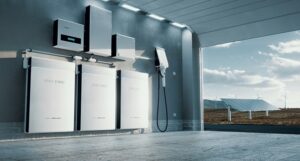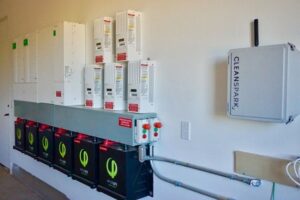The idea of residential energy storage system is getting importance in recent years for providing cleaner and more efficient ways to power our homes.
Residential energy storage is designed to save extra energy being produced from windmills, solar panels, and other renewable sources.
A home energy storage system is a smart choice for homeowners to spend less on energy, rely less on the grid, and reduce their carbon footprint.

Source: https://www.statx.com/wp-content/uploads/2021/05/shutterstock_1806603538.jpg
There is a growing popularity of residential energy in today’s time, but some people are still unaware of this technology. Here is the need of this article which will educate you with the concept of home energy system.
What Is A Residential Energy Storage?
Residential energy storage is like a special battery, which saves extra electricity for later consumption. When you connect to solar panel, it stores the energy during the day and you can use it when needed.
These battery systems optimize electricity use and help solar panels work efficiently. Plus, they make sure your electricity keeps running even if there’s a power cut.
Having residential energy storage comes with the liberty of utilizing the energy generated by the device. The solar panels produce extra energy during the day and store it in the battery. Which you can use anytime you are in need of. This reduces your dependency on the power grid.
You can either get these energy storage batteries when installing solar panels or add them later to an existing solar energy system. These devices are not only good for the environment, but also go easy on your poceksr. No wonder, they are becoming popular among homeowners.
How Does A Residential Energy Storage Work?
Residential energy storage systems are quite straightforward. It uses lithium-ion batteries to store and transfer energy, which you can use to power a many of your home devices.
- The battery is connected to the solar panels, which generate energy during the daytime.
- The energy is transferred to power up devices when needed.
- The extra energy is stored in the batteries for later consumption.
- At night, when solar panels are inactive, appliances use the stored energy.
Modern home energy storage systems are designed to make buildings self-sufficient in terms of energy usage.
Types Of Residential Energy Storage Systems
There are several types of residential energy storage systems available, an each system is different and with a set of unique features. Before you decide to get home energy storage, it’s important to know the different types available.

Source: https://www.energy.gov/sites/default/files/styles/full_article_width/public/2021-11/35974719113_24cfb03c24_o.jpg?itok=kpXUAMpa
Hybrid Residential Solar + Energy Storage System
A hybrid solar + energy storage system is made up of solar panels, hybrid inverters, batteries, backup power, and grid-connected loads.
This system can charge the battery directly from the solar panels using the DC-DC conversion method. It changes the battery’s power from DC to AC and back, which means it can both charge and use the battery’s power.
In the daytime, the solar power is first transferred to the appliances that need it, and then to the battery. If there’s extra power left, it goes back to the grid.
In the evening, the battery is discharged to meet the electricity needs of the household, when the additional power needs are met by the grid. In case, the grid stops working, the system will deliver power to the critical loads.
Additionally, it allows users to set the battery charging and discharging times to meet their electricity needs.
Off-Grid Residential Solar + Energy Storage System
This energy storage system is useful in areas with are no power grids. It contains of solar panels, off-grid energy storage inverter, batteries, and loads. The good thing about this system is that it can connect to diesel generators, which makes it extra helpful.
Places where the regular power supply is unreliable or does not exist at all use it the most. It directly charges the battery from the solar panels using a method called DC-DC conversion. It supports bidirectional DC-AC conversion.
It charges the battery and transfers solar power to connected devices during the daytime. At night, the battery uses the stored energy to supply power to the connected loads. In case, you need more power, the diesel generator will step in and meet the energy shortage.
AC Coupled Residential Solar + Energy Storage System
AC-coupled solar + energy storage is an ideal choice for homeowners with existing solar panels. This setup includes solar panels, an AC-coupled energy storage inverter, an existing inverter, backup power, and batteries.
It uses AC coupling to convert a regular solar energy system into one that can store energy. To put it simply, it works like a hybrid inverter.
In the daytime, the solar power generated is transferred to the load and used for charging the battery. The extra energy is then sent to the grid.
At night, the battery powers the connected loads. If the grid goes down, the battery powers the important devices. The user-defined charging allows you to set the time when you want the battery to charge and transfer power.
Benefits Of Installing A Residential Energy Storage System
Let us now take a look at the benefits associated with a residential energy storage system.

Source: https://www.energy-storage.news/wp-content/uploads/2022/08/duracell-power-center-via-facebook.jpg
Reduced Energy Bills
It helps reducing energy expenses and stores extra energy from renewable sources, allowing you to use it when energy prices are at peak.
Improved Energy Efficiency
A residential energy storage system helps in storing surplus energy which allows you to use it when demand is high. This not only lowers your energy bills but eases the burden on the grid.
Reduced Dependency On The Grid
Having a residential energy storage system reduces dependency on traditional energy sources. This proves to be beneficial during power cuts. It serves as a backup power source for emergencies.
Final Words
Residential energy storage systems give away a great deal of benefits for homeowners. They help to reduce energy bills by storing excess energy generated from renewable sources. Using home energy storage is the best way to boost energy efficiency and saves a great deal on electricity charges.

